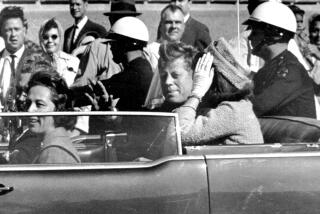William Eckert; Renowned Pathologist
- Share via
Dr. William Eckert, a forensic pathologist and consultant on several high-profile investigations--including the assassination of Robert F. Kennedy and the legendary slayings by Jack the Ripper--has died at age 73.
Although he spent most of his professional career in Wichita, Kan., where he was deputy coroner of Sedgewick County before becoming an independent consultant, Eckert had an international reputation.
Medical examiners from around the world would call with a difficult case, be it a homicide or a peculiar natural death. More often than not, Eckert was able to help them solve their mystery.
“He was instrumental in establishing the active international communication system in forensic medicine in place today,” said Dr. Thomas Noguchi, a former Los Angeles County coroner who was a close friend of Eckert.
Born in Union City, N.J., William Gamm Eckert graduated from New York University, where he ran track and played football. After serving in the Army in World War II, Eckert earned a medical degree from Bellevue Medical School at NYU. He worked at the Public Health Hospital in New Orleans and the New Orleans Parish coroner’s office after completing his residency at Tulane Medical School.
He settled on Kansas as a place to practice, and years later, when high-profile colleagues like Noguchi were facing political problems, Eckert said he was happy he decided on the low visibility of Kansas.
But Kansas was still the place where officials called looking for Eckert when they had trouble solving cases.
In an interview with The Times some years ago, Eckert recalled the time that officials in North Dakota called him about the case of two men who had died in the same hotel sauna within a week of each other. Neither had a heart problem, nor was there evidence of violence.
Eckert, who by that time had developed an international reputation and a thick Rolodex, called a pathologist in Finland, where saunas are popular. The pathologist said that in those cases, carbon monoxide poisoning was almost always the cause.
With that tip, officials in North Dakota discovered carbon monoxide poisoning in both bodies--and a defective heater box.
Eckert was an active participant in the early days of the National Assn. of Medical Examiners in the 1960s and was the founding editor of its official publication, the American Journal of Forensic Pathology and Medicine.
In 1969, he organized the first international exchange in forensic medicine between the United States and the Soviet Union, leading a group of U.S. scientists to meetings in Moscow and St. Petersburg.
Three years earlier, he established the International Reference Organization in Forensic Medicine, which was something of an Interpol for forensic medicine. The organization published its journal four times a year, keeping members up to date on the latest developments in forensic medicine.
Noguchi recalled the advice Eckert gave him after Kennedy was fatally shot in a Los Angeles hotel.
“Bring Washington D.C. to Los Angeles,” Eckert said, reminding Noguchi of the jurisdictional disputes that occurred after the assassination of President John F. Kennedy in Dallas in 1963.
So Noguchi invited pathologists from the armed forces to observe the autopsy here. He also asked Eckert to review the report before its release.
In the late 1980s, Eckert was a member of an eight-person team of pathologists who reinvestigated the Jack the Ripper slayings of seven prostitutes in London in the late 1800s.
Eckert believed that criminal profiling, then a new discipline, might help. After studying the evidence, the group came to the conclusion that the killer probably had been a butcher by trade.
Eckert died Sept. 17 in New Orleans of heart failure.
He is survived by his wife, Haroldine; a son, William H. Eckert of New Orleans; a daughter, Mary Ellen Potucek of Simi Valley; a brother, Frederick Eckert of Pennsylvania; and four grandchildren.
More to Read
Sign up for Essential California
The most important California stories and recommendations in your inbox every morning.
You may occasionally receive promotional content from the Los Angeles Times.












